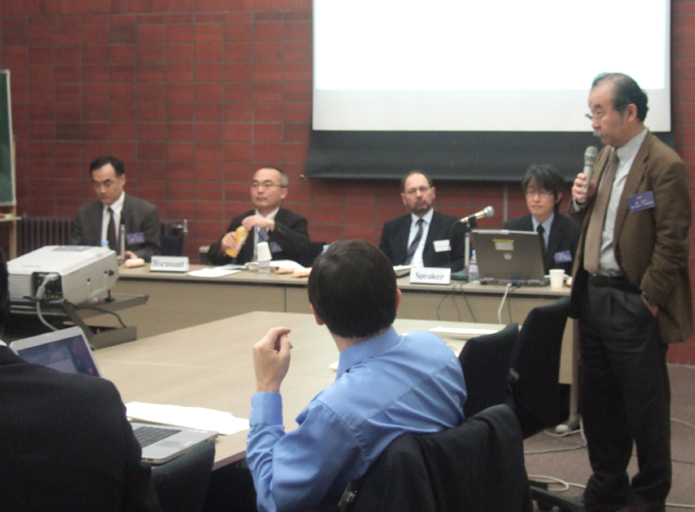|
International Workshop: “Post-Communist
Transformations: The Countries of Central and Eastern Europe and Russia
in Comparative Perspective”
January
5, 2009, by Atsushi Ogushi
Inviting
three well-known foreign specialists from the US, the UK and the Czech
Republic along with three Japanese scholars, an international workshop,
“Post-Communist Transformations: The Countries of Central and Eastern
Europe and Russia in Comparative Perspective,” was held at the Slavic
Research Center on December 5, 2008. This workshop was part of a
three-year project led by Professor Tadayuki Hayashi, “Comprehensive
Comparative Analysis of the System Transformation in the CIS and
East-European Countries,” which is sponsored by the Japan Society for
the Promotion of Science as Grants-in-Aid (A).
At the first panel discussion on Russian politics, Atsushi Ogushi
discussed the development of the executive diarchy in Russia
(presidency and government) from the CC CPSU and the Council of
Ministers in the USSR. In this context, Ogushi argued that the role of
the presidential administration is to contain departmental and
centrifugal bureaucracy. The huge discrepancies between the “regime”
based upon administrative power and institutionalized constitutional
politics as a fundamental problem of contemporary Russian politics were
investigated by Richard Sakwa. Such gulfs were exemplified by the weak
representational role of political parties and so forth. A discussant,
Kimitaka Matsuzato, and many other participants addressed questions
over the role of contingencies in the formation of the Russian diarchy,
the current role of the United Russia party in Russian politics, the
“uniqueness” of Russian society, and others.
At the second panel discussion, Peter Rutland compared Russian and
Chinese development models, both of which started from different
points, developed through different paths, but are now converging into
a similar model, a sort of “regulated market.” Akira Uegaki, having
devised his own analytical model, investigated the “backward” economic
structures of Romania and Bulgaria comparing them with other East
European countries. Discussant Shinichiro Tabata and several other
participants raised important questions and made timely comments. For
example, are the Russian and Chinese development models really
converging? Although the “backward” economic structures of Romania and
Bulgaria are regarded as a negative phenomenon, under the current
financial crisis, there seems to be an upside of their “backwardness.”
While more “advanced” countries like Hungary are suffering heavily from
the crisis, Romania and Bulgaria have been less involved in the world
economy and, therefore, have been less damaged.
At the third panel discussion, with close examination of empirical
data, the large institutional diversity of the social welfare system in
Central and Eastern Europe, and the development of the Czech welfare
system were demonstrated by Martin Potůček. Manabu Sengoku, based on
qualitative and quantitative data, explained such institutional
diversity by highlighting the influences of political and social actors
(mainly political parties, and trade unions). Many questions concerning
the typology of institutional diversity, the degree of influence
wielded by the trade unions, and the impact of the EU on the welfare
system, including those raised by a discussant Takayuki Ito, were
addressed.
The proceedings of the workshop will be published at a later date.
Program:
10:00-12:00
|
Atsushi
Ogushi (SRC), "From
the CC CPSU
to Russian Presidency: Development of Semi-Presidentialism in
Russia" |
| Richard
Sakwa (University of Kent),
“Subject or Citizens: Obstacles to the Exercise of Constitutional
Sovereignty
Rights in Contemporary
Russia
.” |
| Discussant:
Kimitaka
Matsuzato (SRC) |
13:30-15:30
|
Peter
Rutland (Wesleyan
University),
“Post-socialist
States
and the Evolution of a New Development Model: Russia
and
China
Compared”
|
| Akira
Uegaki, (Seinan
Gakuin
University),
“EU Integration and ‘Backwardness’
of New Member States: In Case of Romania
and
Bulgaria
”
|
| Discussant:
Shinichiro
Tabata (SRC) |
15:45-17:45
|
Martin
Potucek (Charles
University),
"Welfare or Wild Capitalism in Post-Communist Europe?"
|
| Manabu
Sengoku (Seinan
Gakuin
University),
“Welfare State
Institutions and Welfare Politics in Central and Eastern
Europe: Political Background of Institutional Diversity”
|
| Discussant:
Takayuki Ito
(
Waseda
University
) |

*The views expressed in the essay belong
solely to the author and do not represent the official position of any
organizations to which the author is permanently or was temporarily
affiliated.
[index]
|

